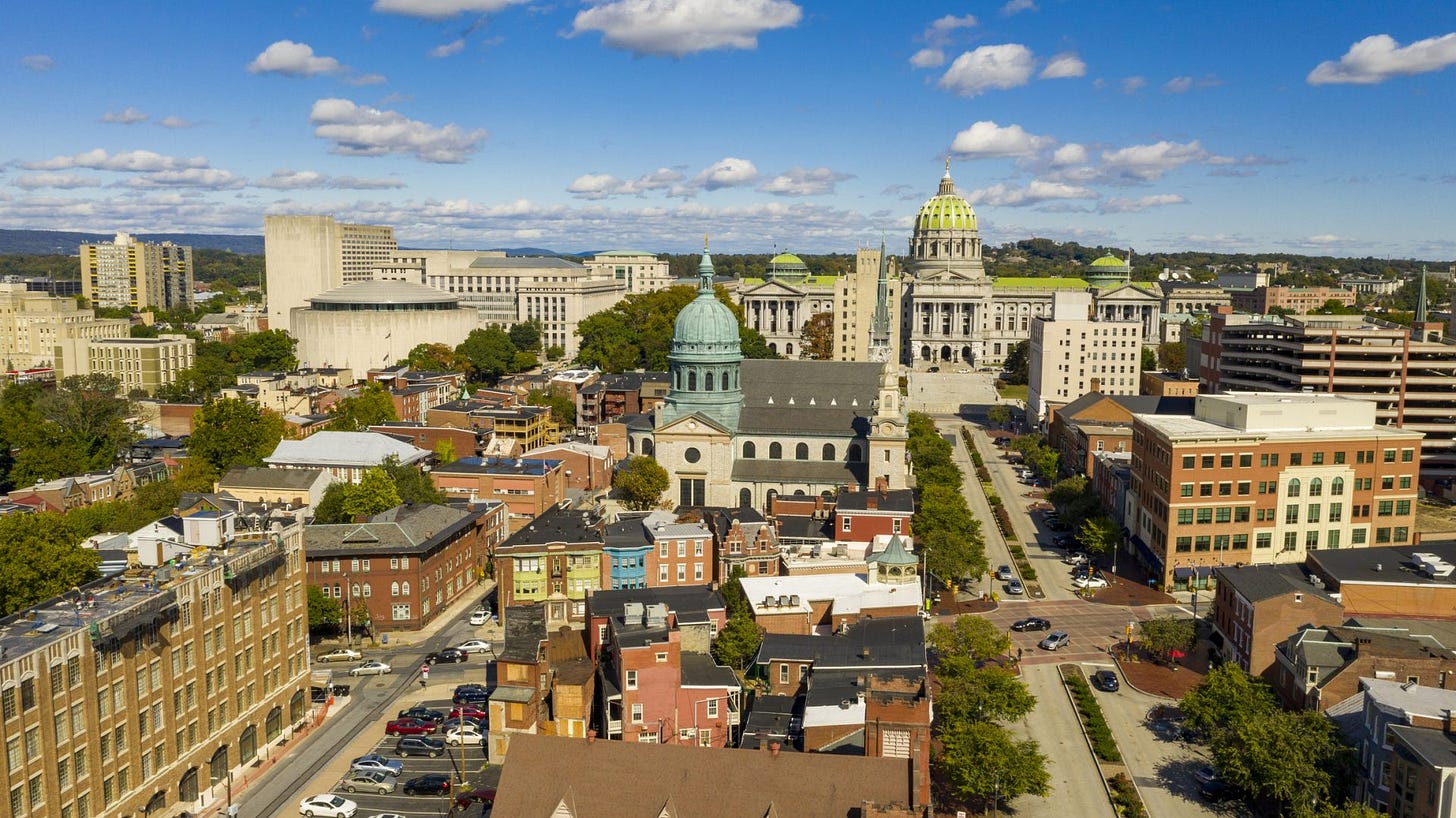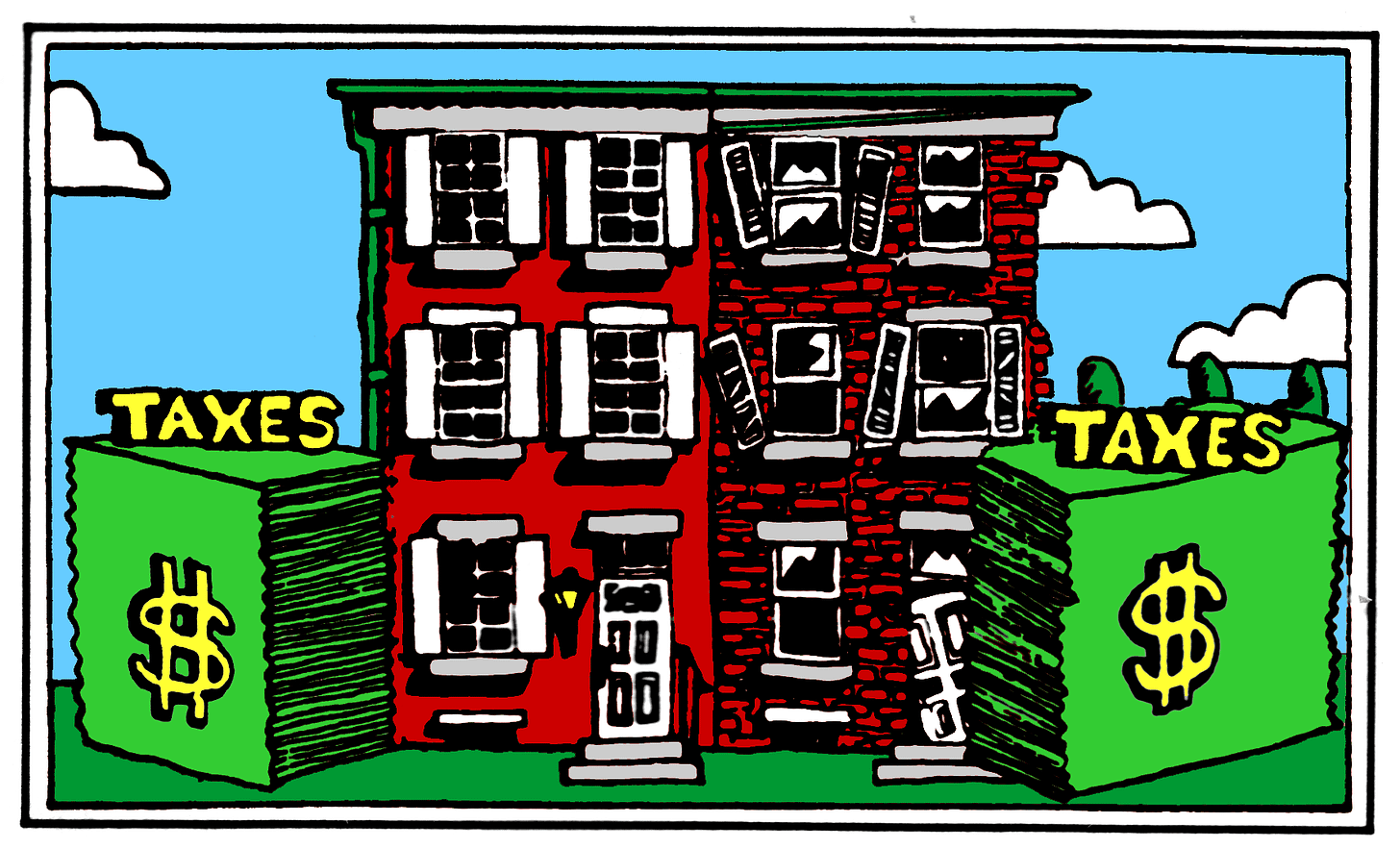The enviro-economic case for land value taxes
A little-known incentive for affordable housing and efficient cities
The land value tax (LVT) has been popular amongst urbanists, climate advocates, and economists throughout the ages, but the idea is missing from mainstream policy discussions in the US. Few places in the US have an LVT despite economists throughout the ages calling it the most efficient form of taxation. Economists like Adam Smith, Paul Krugman, Milton Friedman, and more, have supported an LVT at some point.
So, what is a land value tax? Today’s post is all about the pros and cons of an LVT, what it would mean for US cities, and how cities should view it as a tool in their taxation toolbox.
A land value tax is an alternative to the traditional property tax. It taxes the value of the land without accounting for buildings, personal property, or improvements. By shifting the tax burden to the land value, the LVT aims to incentivize density and limit vacant, unproductive lots. If you own a home in the US, you probably pay property taxes on the value of your home and the improvements you make to the land. Under a land value tax, you would only pay taxes on the value of the land and not any improvements you make to the land. Under a property tax scheme, there is less incentive for landowners to build much-needed housing when they could easily continue profiting off of downtown parking lots - and by now you must know I’m not a fan of excessive parking lots in urban areas.
This distinction means land-owners would be less likely to make parking lots, and more likely to build housing, start businesses (create jobs), etc., because they will need to make the land productive to pay for land value taxes.
The LVT is well-loved by economists and is frequently noted to be the most efficient of all taxes. Some economists even think the LVT is the only tax that we actually need, and we could do away with the income taxes and the rest of them by adopting a strong LVT. Paul Krugman, the Nobel winning economist, has a mostly positive stance on land value taxes in which I agree:
"Believe it or not, urban economics models actually do suggest that [land value] taxation would be the right approach at least to finance city growth. But I would just say: I don't think you can raise nearly enough money to run a modern welfare state by taxing land. It's just not a big enough thing."
It may not be the only tax we ever need, but the LVT is a good tool for cities looking to fight housing and climate issues, among others. Let’s take a deeper dive into the pros and cons.
Benefits of an LVT
The idea dates back at least to the 1400s, but it was popularized by Adam Smith in his 1776 book The Wealth of Nations, and even more popularized later by Henry George in his 1879 book Progress and Poverty. In fact, George popularized the idea so much that economists now call it “Georgism.” More conservative economists such as Milton Friedman called it “the least bad tax,” which is pretty good for a guy that President Reagan hired. Political leaders like Winston Churchill and scientists like Albert Einstein were also in favor of a land value tax. The point is this - really smart people from many different economic eras and political backgrounds have liked the idea. So, why did they like it so much?
A few benefits of a land value tax:
Incentivizes more housing development;
Dis-incentivizes land speculation;
Decarbonizes cities;
Recognizes that land is finite and should be valued as such;
Is a progressive tax that decreases economic inequality;
Is a cost not passed onto tenants;
Can replace taxes on income, property; and more.
A land value tax helps society value a finite resource and steers us towards being more intentional and efficient with our land. The tax also helps drive down housing costs as single-family homes would be less prevalent, and multi-family housing would be more prevalent. Furthermore, LVT has progressive qualities as the price of the tax can’t be passed on to the tenant.
The price of the tax is not passed on to tenants because the amount of land is fixed, therefore there is no deadweight loss created. Actually, sometimes there is negative deadweight loss (a positive externality, which is a good thing). I found some good graphs on Quora (I don’t know the original source) that help explain deadweight loss and the difference between traditional goods and a fixed good like land:
Traditional goods:
Fixed goods like land:
Another benefit is that a land value tax is good for the environment. Denser cities allow for more efficient cities and bring people closer to things they need like healthcare, food, transit, jobs, friends, family, etc. People will be driving less because 1) there’s sufficient walkability and transit potential in a denser city, and 2) people won’t want to pay to store their car somewhere.
Proponents of an LVT, and smart ones at that, point to an LVT future where housing is plentiful and affordable, people have reliable public transit, cities are walkable and safe, and we emit far less greenhouse gases. But, if so many smart people have been in favor of it, then why are there only 20 cities in the US that have some form of LVT?
Minor downsides of a land value tax
There are essentially two notable reasons that it’s a tough policy idea. First, the LVT is fairly hard to explain to someone that doesn’t study tax policy, which means it’s not an easy idea to campaign on if you’re a politician. Second, an LVT would redistribute the winners and losers - which also isn’t an easy idea to campaign on.
Let’s say we could flip a switch and tomorrow your city imposed a land value tax - there would be a massive shift of winners and losers in the city. Those that speculate on unproductive land would suddenly wonder how the heck they were going to pay taxes for all of the land they were hoping would appreciate infinitely without consequences. On the flip side, those with little to no wealth would have more affordable housing prospects on the horizon. It would disrupt the current economic hierarchy.
Now, a progressive redistribution of wealth like this may be what the US needs, but the idea is far from being politically backed. Most people will hear “land value” and “tax” in the same sentence and think it’s another hurdle to home-ownership - even though it would make housing more affordable for first-time homeowners. So, how would a politician make an LVT suitable for the campaign trail?
Pennsylvania cities may have the solution
Remember the 20 US cities with an LVT that I mentioned earlier? Well as it turns out, all 20 of those cities are in the state of Pennsylvania. None of the cities have completely replaced their property taxes with land value yet, but they’re taking a gradual approach to introducing LVT in their communities. By slowly increasing the ratio of taxes collected from buildings and improvements to land value, towns like Harrisburg, PA overcame difficulties like bankruptcy.
Harrisburg mayor, Stephen Reed, had this to say about their land and property taxes:
With over 90% of the property owners in the City of Harrisburg, the two-tiered tax rate system actually saves money over what would otherwise be a single tax system that is currently in use nearly all municipalities in Pennsylvania.
We therefore continue to regard the two-tiered tax rate system as an important ingredient in our overall economic development activities.
I should note that the City of Harrisburg was considered the second most distressed in the United States twelve years ago under the Federal distress criteria. Since then, over $1.2 billion new investment has occurred here, reversing nearly three decades of very serious previous decline. None of this happened by accident and a variety of economic development initiatives and policies were created and utilized. The two-rate system has been and continues to be one of the key local policies that has been factored into this initial economic success here.
It’s become obvious to Harrisburg how increasing the amount of LVT can relieve tax obligations for developers and homeowners.

The land value tax should be regarded as a tool in a local governments toolbox, but many states don’t allow cities to tax land at a higher rate than the buildings on it. This is the obvious first step in allowing cities in America to become more efficient and just - make it legal!
From there, cities should opt to slowly transition from their current tax situation to either a full LVT or split-rate tax system like those found in Pennsylvania and they should update zoning and transportation infrastructure to support a denser, more efficient, healthier, urban environment.
Affordable housing and efficiency is not yet legal, but it’s possible.





